
This week RhymeZone, the rhyming dictionary and thesaurus website, turns 20 years old! To celebrate, there are several new features to announce.
Some history: I created the “Semantic Rhyming Dictionary” while a student back in 1996, renaming it as the more euphonious "RhymeZone" in 2000. Since then the site has answered billions of search queries from tens of millions of creative people around the English-speaking world: songwriters, copywriters, poets, pranksters, puzzle solvers, and more. It's been the subject of jokes, songs, and copious praise (and some parody, too). While no reference tool can match the power of the human imagination, my hope is that RhymeZone can assist and augment. Think of it as a colorful companion on your writing excursions.
20 years on, RhymeZone is still a work in progress. While I've made occasional tweaks to the site over the years, I’ve only recently started to invest in more substantial improvements. In this post I'd like to highlight the 7 recent developments I'm most excited about.
1. Lyrics and poems
Alongside your rhymes, RhymeZone now shows you excerpts of poetry and song lyrics that illustrate how your word has been used in rhymes by well-known poets and musicians.
Depending on your writing goal, this new feature can be useful for harvesting more ideas for your work, for steering clear of well-worn rhymes, or for meditating on all the imaginative ways that a topic has been treated in existing music and poetry.
By design, the examples span myriad genres — musical theater, hip hop, pop music, nursery rhymes, classical poetry, and Shakespeare, to name a few. More than a million songs and poems have been scanned from the Web, and the verses are selected and sorted for each query to prioritize diversity and notability.
Here's how it works on your side of the screen. When you do a normal RhymeZone search for a word such as "beach," a verse will appear in a green box like the one below:

You can flip through up to 200 examples by clicking the “↻” icon, or see them all on one page by clicking on the "200 examples" link. (You can also get to this page using the "Show poetry and lyrics" dropdown option that appears on the desktop website, or by clicking on the "Lyrics and poems" link that appears the top of any search results page.)
On the lyrics page for “beach” you'll see this Longfellow verse together with a wide range of strange bedfellows: verses from Lewis Carroll, Bob Dylan, U2, the Ramones, Iron Maiden, Gorillaz, and dozens more. Click a title to visit the most authoritative page about the work (according to Google's "I'm Feeling Lucky" feature), often a music video, Wikipedia article, or the artist’s own page.
You'll notice that the majority of these "beach" verses (142 out of 200, or 71%, to be precise) pair it with the word "reach." This means if you're aiming to be less predictable in your songwriting you might look beyond "reach." Fortunately many other choices are within, er, reach, and you can see them by clicking on the grey dropdown box that says "Filter by rhyme...":

Here you can narrow down the list to the ones that use some of the less-typical rhymes like “peach” and “teach.” For example there's Syleena Johnson's pithy (but not pitty) couplet from More: "Like sand to a beach / The sweet to a peach."
Of course, you can see hundreds of other rhyming words for “beach” on the regular RhymeZone search results page where you started, though not all will have as many good example verses. Like “pleach," a verb that means to intertwine, or “medicinal leech.” There’s surely a song in that!
The lyrics feature is also good at revealing imaginative multi-word rhymes (sometimes called broken rhymes) as well as near rhymes that match the target word imperfectly. For example, the word "nocturne" (a sad piano piece) has no perfect single-word rhymes, but Stephen Sondheim paired it cleverly in A Little Night Music:
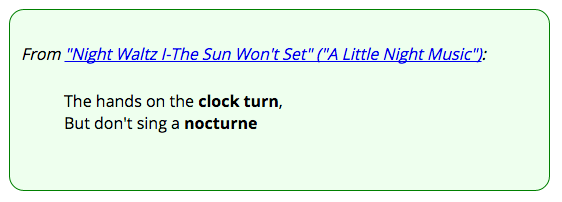
And then there's my favorite rhyme in musical theater, from Stephen Schwartz's Pippin, which comes up when you search for "massacre":
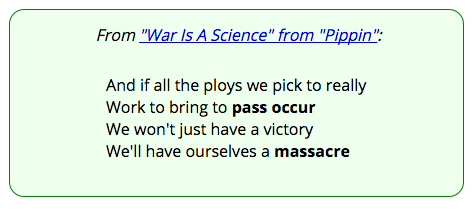
The system finds rhymes even when they’re hiding in front of a common final word, as in this couplet that comes up for “shake”:
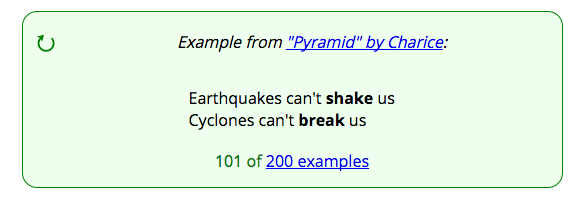
Not to mention internal rhyme, where two or more rhymes are confined within the same line. For example, in the results for “missing”:

2. Near rhymes and broken rhymes
Rhyme is a candy sampler of many rich flavors. True or perfect single-word rhyme was the only flavor offered by RhymeZone for a long time, but in recent years I've gradually added more kinds of near rhymes (also called oblique or false or slant or imperfect rhymes) to the search results. These near misses, useful in some contexts but not others, are given their own section titled “Words and phrases that almost rhyme." They’re also available from the tab labeled “Near rhymes”:
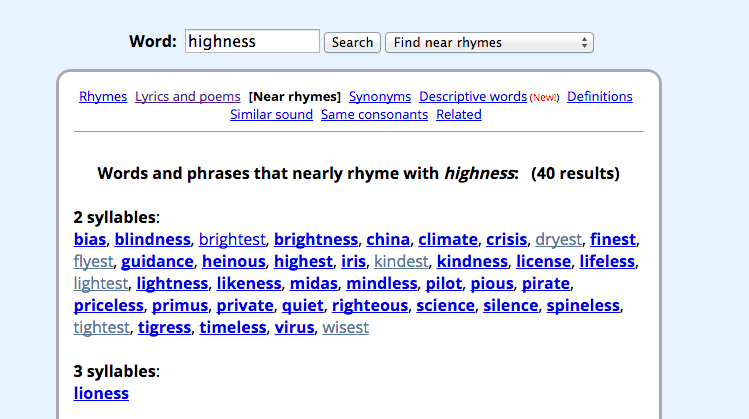
Let’s look at a few examples of near rhymes in the wild:
“Highness” doesn’t rhyme with “finest” in the strictest sense — the final consonant sounds don’t match — but in many contexts it’s a delightful pair, such as in a Danny Elfman song from Corpse Bride: “Rubbing elbows with the finest / Having crumpets with her highness."
Similarly, “forest” and “chorus” aren’t perfect rhymes for the same reason, but they pair well together because the two concepts co-exist well in nature, as in Cactus Tree by Joni Mitchell: “He has missed her in the forest / While he showed her all the flowers / and the branches sang the chorus...."
Would it seem suspicious to rhyme "dishes" with “delicious”? The words sound alike but have slightly different endings (the “s” is delicious is voiceless, while the final “s” in dishes is voiced), so they’re technically imperfect rhymes. But it’s close enough that even pure-rhyme Sondheim used it in A Funny Thing Happened on the Way to the Forum: “Wouldn’t she be delicious / Tidying up the dishes”. (It should be noted that he was sheepish enough about this choice to point out the imperfection in a footnote in Finishing the Hat.)
By contrast, “calling” and “morning” seem very weak as potential rhymes when they’re pronounced in isolation — the stressed syllables are totally different. But listen to Kendrick Lamar’s intro to HiiiPower (“The sky is falling, the wind is calling / Stand for something, or die in the morning”) before passing judgment: it works.
In all these cases you can see how much the context matters. What makes near rhymes hard from RhymeZone’s perspective is that there are often thousands of possibilities that might work, but most of them are junky. If RhymeZone printed out all of the words that sound as far-off as “morning” when someone searches for “calling," it would take the user hours to read through the results. So it’s not enough merely to apply purely phonetic rules. To decide which near rhymes are sensible together, RhymeZone now uses several other data sources as well: song lyrics, word sequence frequencies (from Google Books Ngrams), and the search activity on RhymeZone itself going back more than a decade.
The same thinking applies to multi-word (broken) rhymes, even when there’s a perfect match. For example, let’s return to Sondheim’s nocturne / clock turn rhyme from earlier in this post. RhymeZone spits out “clock turn” and “lock turn” and “rock turn” and a couple others when you search for “nocturne,” but it avoids suggesting meaningless phrases like “spock tern” or “glock stern” or “smock spurn” since it has data about which word combinations are plausible.
For some words RhymeZone still does suggest a fair degree of nonsense, and it fails to find good matches for others. For instance, when you search for “personable,” it fails to find Sondheim’s masterful “coercin’ a bull." The highest priority for RhymeZone is to increase the breadth and accuracy of these near rhymes and broken rhymes, since they’re crucial to so many songwriters.
3. Filter by meaning
Many words have hundreds or even thousands of reasonable rhymes, even when you only count the "perfect" ones. In such cases it can be helpful to narrow down your choices by meaning, because you usually have some idea of the kind of word you're looking for.
When many words rhyme, RhymeZone will now show you a little grey box at the top right of the results section that looks like this:

If you click it and type a topic, RhymeZone will do its best to filter the rhymes and highlight the words it thinks are related to the topic.
Suppose you're Samuel Taylor Coleridge writing the famous unfinished narrative poem
Christabel but you're stuck on the final words of two lines:
She stole along, she nothing spoke,
The sighs she heaved were soft and low,
And naught was green upon the [ ? ]
But moss and rarest [ ? ]
Here Coleridge needs a rhyme for "spoke" that means some kind of tree, and he needs a rhyme for "low" that means something related to plants. If you don't already know the poem, can you guess what he chose?
Search for rhymes of "spoke" and then enter "tree" into the box, and RhymeZone will highlight the winner, "oak," and many varieties thereof.
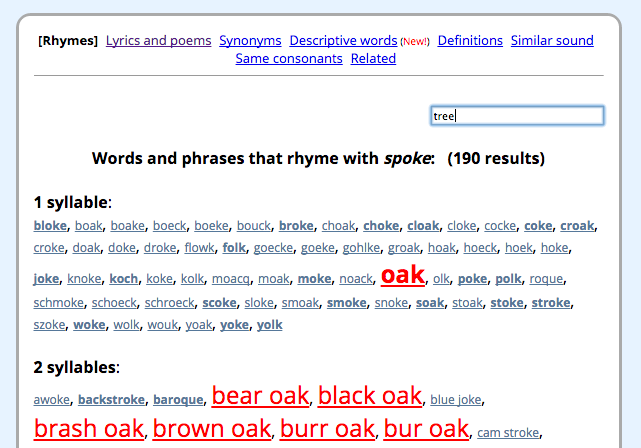
Similarly, a rhyme for "low" that means something related to plants? You'll get such words as "grow," "aloe," and Coleridge’s choice, "mistletoe."
4. Descriptive words
Another recent addition to RhymeZone is the tab called "Descriptive words," which lists adjectives that are well-suited for a given noun, and nouns that are well-suited for a given adjective. This is particularly useful for adding imagery to your writing.
For example, suppose you’re trying to describe mistletoe dramatically, as Coleridge was in Christabel. What are some adjectives that occur to you? “Green” and “leafy” occur to me. These adjectives are relevant to mistletoe but might be too plain for your needs. Using this new RhymeZone feature you can tap the collective wisdom of humankind to get some more refined ideas:
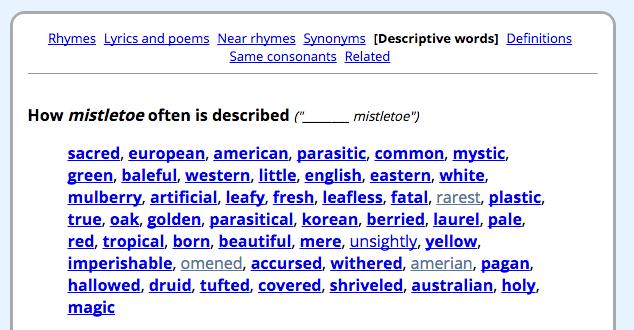
You'll find Coleridge’s “rarest” is there in the list, as well as some other positively charged adjectives like “mystic” and “hallowed” and “holy." If you were writing a horror story you might prefer “baleful” or “accursed” or “withered." (“Baleful," by the way, is probably on the list because of Shakespeare’s characterization of mistletoe in Titus Andronicus.)
You can go in the other direction, too — that is, you can find the nouns that are popularly described by a certain adjective. For example, what things are described as leafy? Here's what:

This feature gets its smarts from the Google Books Ngrams data, a publicly available analysis of millions of English-language books written over the past few hundred years.
5. Smart Suggest
As you're entering a word into the RhymeZone search box you'll see a familiar "autocomplete" dropdown that shows you our best guesses as to what you're starting to type. This will save you from having to type out the entire word, which is particularly timesaving when you're on a mobile device or unsure of the spelling of the word.
Autocomplete and autocorrect are nothing new, but I'd like call attention to some features of RhymeZone's autocomplete that make it particularly useful for writing. For one thing, it's very resilient to typos. For another, it has a couple of fun shortcuts. If you type a word or phrase followed by a question mark ("?"), the autocomplete box will show you terms contextually related to that word or phrase. This can be a good way to explore alternative directions in your poetry or prose. For example, suppose you're writing a poem about sitting in front of a crackling fire on on a winter evening, and you want to bring some chimney imagery into the picture. Type "chimney?" and you'll get words like "soot," "flue," and "sweep" in the box.
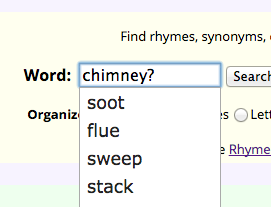
You can also use the asterisk ("*") symbol in the search box to act as a placeholder for any number of letters. If you type "*nace," for example, you'll see a list of words that end in "nace" like "menace" and "furnace." Or if you're looking for words that start with "a" and end in "ation," type "a*ation" to get choices like "aspiration," "alliteration," and "accommodation." (This is particularly useful for generating candidates for, well, alliteration — repetition of the starting sounds in a sequence of words.)
By the way, it's a passion of mine to get autocomplete working well on search engines of all kinds, especially on dictionary-oriented sites. If you own or know of a site where this might be helpful, point them to this service. Also, I can't possibly discuss the topic of autocomplete without referencing this excellent webcomic (note: not safe for most workplaces).
6. API
“Developers! / Developers! / Developers! / Developers!” goes a famous quatrain by an ancient master of identity rhyme, Steve Ballmer. Over the years we've gotten hundreds of requests from developers wanting to use rhymes and synonyms and such in their websites or mobile apps. It's not hard to create your own basic rhyming dictionary and it's a good programming exercise to do so, but many of the features in RhymeZone (such as the near rhymes and the "meaning" filtering described above) depend upon a large amount of server-side data that you may not want to reproduce on your end.
If you're a developer you may may be interested in the JSON API we recently added. This API gives programmatic access to most of the functionality of both RhymeZone and its button-down sister site, OneLook, and lets you mash up the data in interesting ways. You can use it in your apps without restriction for up to 100,000 queries per day.
If you’re interested, check out the complete docs here.
7. Poetry prize
Finally, Datamuse is happy to announce that the 2016 RhymeZone Poetry Prize is now underway. This year's contest encourages people of all skill levels to write poems on the theme of Community.
The RhymeZone Poetry Prize is somewhat unusual for a writing contest in that there are no strings attached: There are no entry fees or restrictions of any kind other than legal eligibility requirements. Submissions are posted publicly to the RhymeZone Forum community, where fellow authors can read and critique your work. And you don't have to rhyme!
Last year’s contest was a great success with more than 3000 authors contributing poems. We look forward to lots more thought-provoking verse this year.
The deadline to is April 12, the middle of National Poetry Month in the U.S. and Canada (when we plan to have some more RhymeZone updates to report.) See this page for the complete rules and guidelines.
Thank you!
Special thanks go to Harvey Beeferman, Castedo Ellerman, Fritz Holznagel, John Knowles, Linus Wong, Vitus Wong, and many others who have contributed to making and moderating RhymeZone, the RhymeZone mobile apps, RhymeZone Forum, and the Poetry Prize over the years. And thank you, gentle readers and rhymers, for your two decades of support and feedback!
That’s it for now! See you in April.
Doug Beeferman

